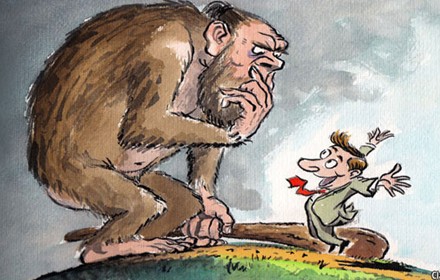
『人类对陌生人友好的冲动并非是生理异常。』
The evolution of generosity:Welcome, stranger
慷慨行为的进化历程:欢迎你,陌生人
Jul 30th 2011 | from the Economist

THE extraordinary success of Homo sapiens is a result of four things: intelligence, language, an ability to manipulate objects dexterously in order to make tools, and co-operation. Over the decades the anthropological spotlight has shifted from one to another of these as the prime mover of the package, and thus the fundament of the human condition. At the moment co-operation is the most fashionable subject of investigation. In particular, why are humans so willing to collaborate with unrelated strangers, even to the point of risking being cheated by people whose characters they cannot possibly know?
Evidence from economic games played in the laboratory for real money suggests humans are both trusting of those they have no reason to expect they will ever see again, and surprisingly unwilling to cheat them—and that these phenomena are deeply ingrained in the species’s psychology. Existing theories of the evolution of trust depend either on the participants being relatives (and thus sharing genes) or on their relationship being long-term, with each keeping count to make sure the overall benefits of collaboration exceed the costs. Neither applies in the case of passing strangers, and that has led to speculation that something extraordinary, such as a need for extreme collaboration prompted by the emergence of warfare that uses weapons, has happened in recent human evolution to promote the emergence of an instinct for unconditional generosity .
Leda Cosmides and John Tooby, two doyens of the field, do not agree. They see no need for extraordinary mechanisms and the latest study to come from their group suggests they are right.
Studying human evolution directly is obviously impossible. The generation times are far too long. But it is possible to isolate features of interest and examine how they evolve in computer simulations . To this end Dr Delton and Dr Krasnow designed software agents that were able to meet up and interact in a computer’s processor.
The agents’ interactions mimicked those of economic games in the real world, though the currency was arbitrary “fitness units” rather than dollars. This meant that agents which successfully collaborated built up fitness over the period of their collaboration. Those that cheated on the first encounter got a one-off allocation of fitness, but would never be trusted in the future. Each agent had an inbuilt and heritable level of trustworthiness (ie, the likelihood that it would cheat at the first opportunity) and, in each encounter it had, it was assigned a level of likelihood (detectable by the other agent) that it would be back for further interactions.
After a certain amount of time the agents reproduced in proportion to their accumulated fitness; the old generation died, and the young took over. The process was then repeated for 10,000 generations to see what level of collaboration would emerge.
The upshot was that, as the researchers predicted, generosity pays —or, rather, the cost of early selfishness is greater than the cost of trust. For most plausible sets of costs, benefits and chances of future encounters the simulation found that it pays to be trusting, even though you will sometimes be cheated. Previous attempts to study the evolution of trust using games have been arranged to make it clear to the participants whether their encounter was a one-off, and drawn their conclusions accordingly. That, though, is hardly realistic. In the real world, although you might guess, based on the circumstances, whether or not you will meet someone again, you cannot know for sure. Moreover, in the ancient world of hunter-gatherers, limited movement meant a second encounter would be much more likely than it is in the populous , modern urban world.
No need, then, for special mechanisms to explain generosity. An open hand to the stranger makes evolutionary as well as moral sense. (743 words)
Homo sapiens /9hEUmEU 5sApIenz/ n. 智人(全比现代人的属和种)
dexterously /5dekstrEslI/ adj. 善于用手的;手巧的
anthropological /9AnWrEpE5lCdVIkl/ adj. 人类学的
prime mover n. 发起者;推动者;原动力
人们在实验室里进行了一项可以赢现金的经济游戏,其中所得证据表明,人们不仅会相信那些没理由期待还会再次碰面的人,而且会莫名其妙地不愿意欺骗他们。这些现象已经在人类的心理意识中根深蒂固了。ingrained(in sth):根深蒂固的;日久难改的
keep count:(在一段时间内)记录变化的数字,如:I never manage to keep count of what I spend on my credit card. (我从来都记不清信用卡的支出。)
generosity /9dVenE5rCsEtI/ n. 慷慨或宽容的行为
doyen /5dRIEn/ n. (团体、职业等的)资深者,老前辈
mechanism /5mekEnIzEm/ n. (生物用来自我保护的、躲避危险的)机制,行为方式
simulation /9sImjU5leIFn/ n. 模拟操作
mimic /5mImIk/ v. 模仿(人的行为举止)
arbitrary /5B:bItrErI/ adj. 任意的;主观的
build up:(使)积累;增强,如:You have to build up trust.(你必须建立起信任。)
encounter /In5kaUntE(r)/ n. 相遇;邂逅
one-off adj. 只发生一次的;一次完成的
allocation /9AlE5keIFn/ n. (钱、 地方等的)配给量
每一个软件代理人内在都有可继承的信赖度(即他可能一有机会就会欺骗别人),在每次与他人相遇的时候,计算机都会安排他可能在以后的交往中还会出现,(这种可能性也是其他代理人可以察觉到的)。at the first opportunity:一有机会(就)
upshot /5QpFCt/ n. 比较后的结果;结局
pay /peI/ v. 受益;划算,如:Crime doesn't pay. (犯罪是得不偿失的。)
plausible /5plR:zEbl/ adj.(指陈述、 借口等)似乎正确的,似有道理的
特别声明:①凡本网注明稿件来源为"原创"的,转载必须注明"稿件来源:育路网",违者将依法追究责任;
②部分稿件来源于网络,如有侵权,请联系我们沟通解决。
25人觉得有用
24
2011.10
『人们开始对消费产品中使用的许多化学物质的安全性提出了质疑,因为如今发现这些化学物质和一些包括癌......
24
2011.10
『负面情绪——愤怒,也有其积极的一面,且看专家们如何证实这一现象。』 The Bright Si......
24
2011.10
『物价飞涨增加了家庭开支,而工资收入却原地不动,这使许多家庭难以应付从而改变了购物习惯。』 H......
24
2011.10
『汉堡,口红和男士内衣有何共同点?一起分享搞怪经济指数的乐趣吧。』 The Big Mac index: Fast f......
24
2011.10
『星条旗可能改变竞选结果。一项研究表明,当让选民在选举时看到星条旗,他们会更倾向于共和党。』 ......
24
2011.10
『儿童保育补助进削减,使更多的女性选择在家照顾孩子而不外出工作。』 Childcare cuts spark rise......